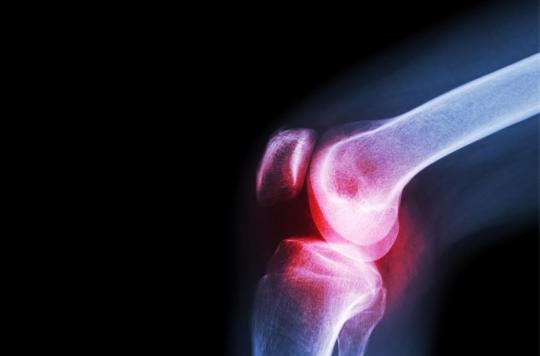In the United States, scientists have developed a hydrogel capable of protecting the joint. It would make it possible to avoid the use of prostheses for people suffering from osteoarthritis of the knee.

- A hydrogel to replace cartilage in knee osteoarthritis has been developed in the United States
- Until then, the materials that could replace the cartilage were not strong enough or wore out too quickly.
- With the hydrogel, it would be possible to avoid the fitting of a prosthesis
Science is sometimes able to mimic nature to perfection! In the United States, researchers have developed a hydrogel whose characteristics are similar to the cartilage present in the knee: it has the same strength and the same elasticity. This discovery, the details of which are published in the journal Advanced Functional Materialscould make it possible to avoid fitting a prosthesis in patients suffering from severe osteoarthritis.
A precious but complex material
Cartilage is an essential part of the joints, it protects them by absorbing shocks. But over the years, it can wear out or even disappear. In people with osteoarthritis, it gets progressively worse. Its consistency is special because it is both solid, which allows it to support the weight of the body, and at the same time flexible, to cushion. Since the 1970s, scientists have sought to develop a hydrogel to replace cartilage, but the material was never strong or flexible enough, or wore out too quickly.
A combination of three structures
The team at Duke University in North Carolina managed to find the ideal product. Made up of polymers and water, the hydrogel is able to support a significant weight: a disc less than one centimeter thick subjected to a weight of 45 kilos is not damaged. It is composed of three structures, one in strand, the other in the shape of a basket and the last one is composed of cellulose fibers. This combination makes it possible to obtain a material that is at the same time flexible, rigid and resistant, like cartilage.
“We have developed the first hydrogel that has the same mechanical properties as cartilage,” enthuses Ben Wiley, co-author of the study. Other tests have proven the solidity of the product: the scientists in particular subjected it to a million frictions against natural cartilage, it did not degrade.
Further tests to come
It will take another three years before the first clinical trials on humans can be launched. Initial tests showed that the material was not toxic to lab-grown cells. But before going further, the researchers must first develop an implant that they will test on sheep.

.

















